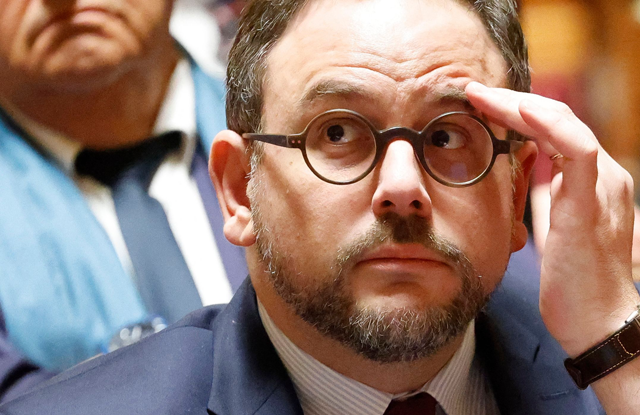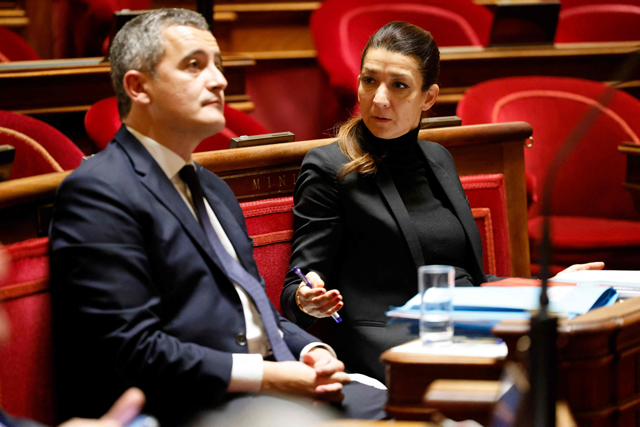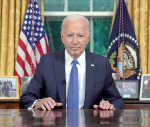You are here
French court censures parts of controversial immigration law
By AFP - Jan 25,2024 - Last updated at Jan 25,2024
PARIS — France’s top constitutional authority on Thursday rejected parts of a controversial immigration bill adopted under pressure from the right, in a ruling applauded by government but slammed by the far-right.
The bill adopted last month is a flagship reform of President Emmanuel Macron’s second term, but the toughened version of the text caused a revolt among lawmakers from the ruling party and led a minister to resign.
The constitutional council upheld much of the bill initially presented by Macron’s government, but censured contentious additions made under insistence from the right and far right.
It notably rejected measures in the bill restricting access to social benefits and family reunification, as well as the introduction of immigration quotas set by parliament.
Interior Minister Gerard Darmanin, who earlier said some measures were “clearly contrary to the constitution”, described the ruling as a win for the government.
“The Constitutional Council has approved all the government’s text,” he wrote on X, formally Twitter.
But Jordan Bardella, president of the far-right National Rally Party, on X criticised what he said was a “coup by the judges, with the backing of the president”.
He called for a referendum on immigration as the “only solution”.
The decision comes as Macron seeks to curb the rapid rise of the far-right, expected to make considerable gains in European elections in June.
Eric Ciotti, the leader of the right-wing Republicans, accused the council’s nine members of having “ruled according to politics not the law”.
‘Victory’
The court dismissed 32 out of 86 amendments on the grounds they were not related to the subject of the law.
They could however be accepted later as part of different legislation.
It also censured at least part of three more over their essence. Among these, it partially rejected the setting of immigration quotas by parliament.
Jean-Claude Samouiller, the head of Amnesty International France, said the ruling was a “victory”.
He said the rights group would remain “vigilant” to make sure no rejected articles suddenly reappeared before it was signed into law.
The law was voted in December after months of wrangling in parliament, where Macron’s centrist party lost an absolute majority in 2022.
Around a quarter of lawmakers in Macron’s camp voted against the bill or abstained, and health minister Aurelien Rousseau resigned.
Dozens of non-governmental organisations had slammed what they described as potentially the “most regressive” immigration law in decades.
Tens of thousands of people took to the streets across France at the weekend in protest at the law.
Macron submitted the legislation to the constitutional council for review in an effort to calm tensions.
But he also defended the bill, saying it was needed to reduce illegal immigration and to facilitate the integration of documented arrivals.
Some political observers had accused Macron of seeking to pass the buck onto the constitutional council, by submitting legislation he believes to be unconstitutional.
The constitutional council registered its displeasure, saying it is not “a chamber of appeal against the choices made by parliament”.
More deportations
It was a rare request in the history of the council, which was established by the 1958 constitution that instituted France’s Fifth Republic.
“Referring to the constitutional council is not a shocking solution in itself,” Anne Levade, an expert in public law, said before the decision.
But it is “of course, a little more shocking” when members of the government are convinced of “the unconstitutionality of certain provisions”, she added.
Also on Thursday, the interior ministry released its immigration figures for last year, showing France deported 17,000 people from the country, a 10 pe rcent hike compared to 2022.
More than 323,000 people were awarded first-time residency papers, a slightly higher figure than in 2022, the ministry said.
But Darmanin said more had been handed out for “economic reasons” — students and workers — and less for families seeking reunification.
Related Articles
PARIS — France’s health minister resigned as the government of President Emmanuel Macron on Wednesday sought to quell a party revolt over th
PARIS — France’s upper house Senate on Tuesday passed a bill aimed at controlling immigration, toughening the language and measures of the l
PARIS — The French senate starts on Monday to debate a hugely controversial immigration bill that the government says will bolster security


















